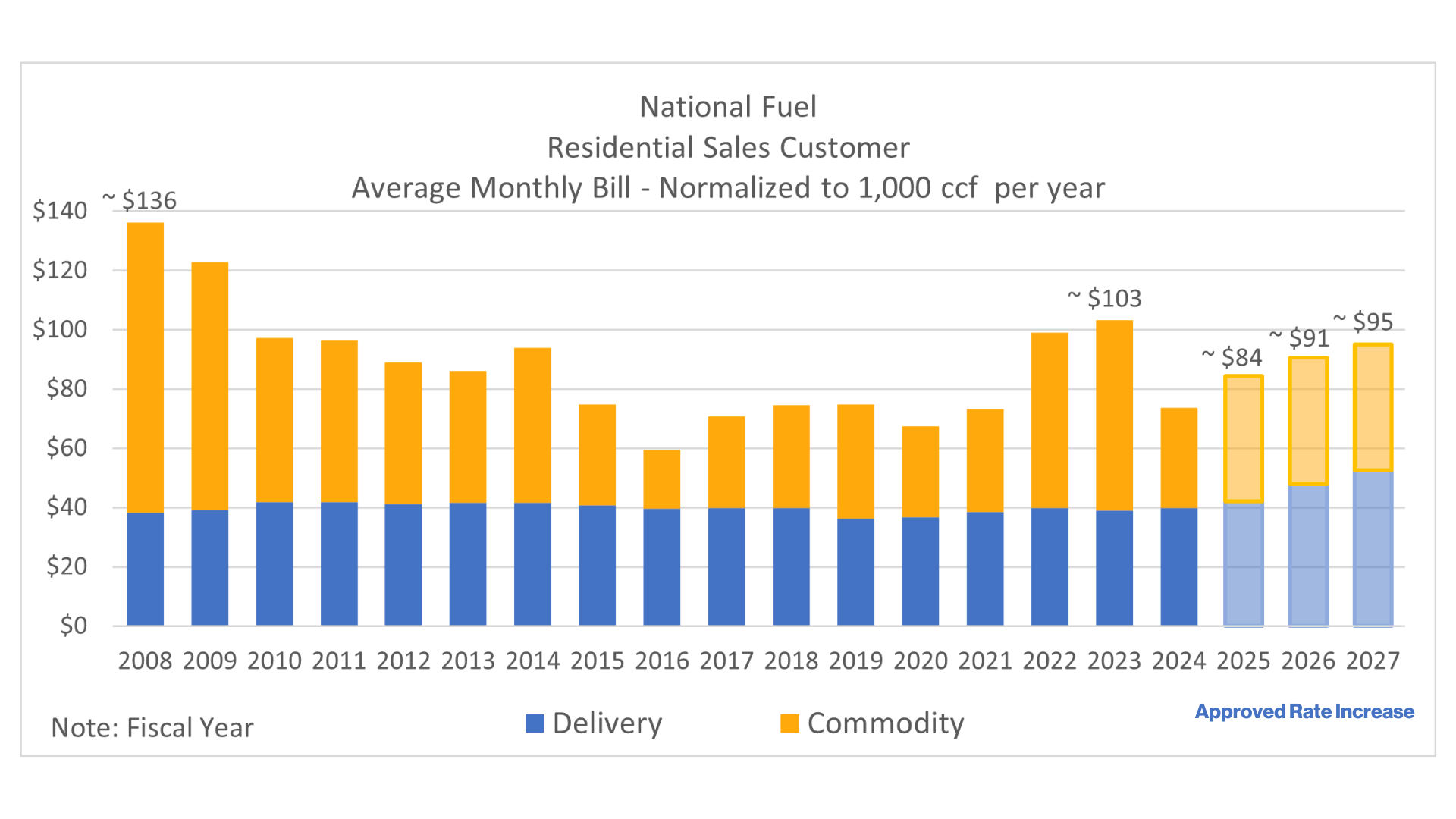National Fuel Gas Distribution Corporation (National Fuel or the Company) received approval today from the New York Public Service Commission (PSC) to increase its base delivery rates and charges for gas service effective Jan. 1, 2025. This is the first increase to National Fuel’s base delivery rates in New York since 2017 and only the second increase in 16 years.
The rate increase is part of an agreement, or Joint Proposal, reached with the New York Department of Public Service and other parties that allows for an annual revenue increase of $86 million over a 3-year rate plan. The added revenues will support necessary investments in National Fuel’s pipeline infrastructure and workforce, address the Company’s rising cost of operating its gas delivery system, and advance more affordable decarbonization initiatives to comply with New York State’s Climate Leadership and Community Protection Act (CLCPA).
National Fuel operates and maintains more than 9,800 miles of pipelines and facilities that provide gas service for approximately 540,000 residential, commercial and industrial customers across Western New York. Since its last rate case in 2016, National Fuel has invested $473 million in modernizing its system, having replaced more than 884 miles of pipeline in New York. The Company is planning an additional $360 million of capital expenditures over the next three years to ensure it continues to provide safe and reliable energy service for its customers.
Under the approved Joint Proposal, National Fuel’s base delivery rates for all service classes will increase three separate times over the course of the 3-year rate plan: (1) Jan. 1, 2025; (2) Oct. 1, 2025; and (3) Oct. 1, 2026. National Fuel is not permitted to request any further increases to its base delivery rates before Oct. 1, 2027.
Residential customer bills will increase on average $5.97 per month, or 5.6%, on Jan. 1, 2025; $6.06 per month, or 7.2%, on Oct. 1, 2025; and $5.18 per month, or 5.8%, on Oct. 1, 2026. Currently, the average monthly bill of a typical residential customer using 102 thousand cubic feet of gas a year is approximately $80 per month. Even after the rate increase takes effect, National Fuel’s residential delivery rates will continue to be among the lowest for large natural gas utilities in New York State.
According to Donna L. DeCarolis, National Fuel Gas Distribution Corporation President, as a result of smart and efficient cost management practices and a focus on customer affordability, the Company has been able to avoid the need for rate increases for nearly eight years while continuing to invest significantly in safety and system modernization.
“National Fuel, like families and businesses across Western New York, has experienced rising costs due to inflation,” DeCarolis said. “This rate increase was necessary for National Fuel to maintain critical infrastructure, improve our customer experience, and continue to focus on emissions reduction, all while delivering the safe, reliable and affordable energy that 90 percent of Western New Yorkers count on for home heating and comfort.”
The terms of the Joint Proposal, as approved and modified by the PSC, include several provisions relating to gas safety and customer service that will provide benefits and protections to customers. Specifically, the base delivery rate increase will enable National Fuel to invest in the following:
Enhancements to Gas Safety
- Establish Gas Safety Performance Metrics starting in calendar year 2025 relating to leak prone pipe (LPP) removal, gas leak backlog, emergency response, damage prevention and compliance with pipeline safety regulations;
- Maintain accelerated pipeline removal and replacement activity to keep the Company on track to remove all LPP mains and services and achieve a 90% reduction in GHG emissions by 2035;
- Revise operational procedures to comply with anticipated new regulations around enhanced leak surveys; and
- Enhance existing program to distribute more than 102,000 residential methane detectors to low-income customers and customers with inside gas meters.
Enhancements to Customer Service
- Maintain the Energy Affordability Program (EAP) with a budget of $12.8 million annually to provide discounts to low-income customers who receive benefits under qualifying public assistance programs;
- Reopen three walk-in customer assistance centers in Buffalo, Cheektowaga and Jamestown;
- Increase funding for the Emergency Heating/Repair Replacement Program to restore heat to homeowners including elderly, blind, disabled and certain low-income customers by repairing or replacing their primary heat source;
- Continue funding for a Neighborhood Legal Services Program which allows a paralegal to provide legal representation in obtaining certain emergency assistance; and
- Establish Customer Service Performance Indicators starting in calendar year 2025 relating to customer satisfaction, call center answer rates, estimated bills and PSC complaints.
Additionally, the Joint Proposal advances several National Fuel initiatives that support the objectives of New York State’s CLCPA. These initiatives include a Responsibly Sourced Gas pilot program, the evaluation of non-pipes alternatives for certain capital and economic development projects, and funding for hydrogen-related research, development and demonstration projects.
Signatories to the Joint Proposal included New York State Department of Public Service Staff, Multiple Intervenors, International Brotherhood of Electrical Workers (IBEW) Local Union 2199 and IBEW Local Union 2154.
National Fuel recognizes that increases to monthly expenses can pose a hardship for customers. This winter heating season, more than $1,800 in payment assistance may be available for eligible households depending on income and expenses. Customers who are having difficulty paying their bills are encouraged to contact National Fuel at 1-800-365-3234, Monday through Friday, from 7 a.m. to 6 p.m.
